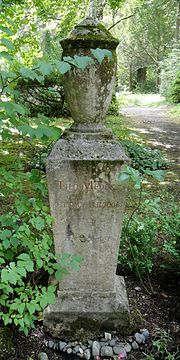Tilo Medek | |
|---|---|
 Medek's grave in the Nordfriedhof in Jena | |
| Born | Tilo Gerhard Müller-Medek 22 January 1940 |
| Died | 3 February 2006 (aged 66) |
| Education | |
| Occupations |
|
| Awards |
|
Tilo Medek, originally Müller-Medek[1] (22 January 1940 – 3 February 2006), was a German classical composer, musicologist and music publisher. He grew up in East Germany, but was inspired by the Darmstädter Ferienkurse. He composed radio plays and incidental music. His setting of Lenin's Decree on Peace led to restrictions, and after he showed solidarity with the expatriated Wolf Biermann, he also had to move to the West, where he composed an opera Katharina Blum based on Heinrich Böll's novel, and worked in education. He received international awards from 1967 onwards.
Müller-Medek was born in Jena, the son of the composer and musician Willy Müller-Medek (1897–1965) and his wife Rosa (1902–1976).[2] He received musical training at the Jenaer Musikschule in violin, piano, improvisation and music theory.[3] In 1957 he attended the 12th Darmstädter Ferienkurse in the western part of Germany[4] where he took classes with Alexander Jemnitz, Luigi Nono, Hermann Scherchen and Karlheinz Stockhausen.[5]
From 1959 to 1962, he studied piano with Kurt Johnen in Quedlinburg. He received his Abitur in 1959, and studied then at the Humboldt University of Berlin, musicology with Walther Vetter, Ernst Hermann Meyer and Georg Knepler.[3] He also took courses in psychology with Kurt Gottschaldt, in art history with Karl-Heinz Clasen, in theology with Lieselotte Richter and in garden architecture with Willy Kurth. He studied at the same time composition with Rudolf Wagner-Régeny at the Deutsche Hochschule für Musik in East Berlin.[3]
From 1962, Medek worked as a répétiteur for the ensemble of the Berliner Arbeiterjugend, and as a composer of radio plays and incidental music. In 1964 he wrote his thesis in musicology: Die Vertonungen von Goethes Prometheus-Gedicht.[3] In 1968, his work was first restricted, because of his compositions Das Dekret über den Frieden after Lenin's Decree on Peace, and "Battaglia alla turca" (later No. 1 from Lesarten an zwei Klavieren).[2] Lenin's text, slightly shortened, is set for speaker and percussion (Schlag-Idiophone, Schlagtrommeln), with the speaker in the middle of the audience, while the percussionists are positioned in the back of the audience in four corners, playing with growing intensity which in the end drowns the voice.[6] In 1977, Medek criticized the Darmstadt School and its influence in the GDR.[7] When Wolf Biermann had to leave the country on 15 July 1977, Medek protested and then also moved to the West.[2][4] From 1982, he ran the music publishing house Musikverlag Edition Tilo Medek.[2] In 1984 he composed the opera Katharina Blum to a libretto by his wife, Dorothea Medek, based on Heinrich Böll's novel Die verlorene Ehre der Katharina Blum (The Lost Honour of Katharina Blum).[8] Revised in 1986, it premiered at the Theater Bielefeld on 20 April 1991.[8] Medek died in Duderstadt in 2006.[9]
Medek's works included chamber music and piano pieces, and settings of poetry by Bertolt Brecht which were performed by singers such as Sonja Kehler. He composed many works for choir and orchestra, receiving international recognition for Die Todesfuge after Paul Celan's poem "Todesfuge". Medek composed two radio plays broadcast by Radio DDR 1. He wrote extended stage works, such as the opera Katharina Blum. He composed three symphonies: Die Eisenblätter, Die Rheinische, Die Sorbische, and several concertos for solo instrument and orchestra. He wrote many works for organ. He received awards for his Die betrunkene Sonne (The drunk sun) for speaker and orchestra, a melodrama for children on a text by Sarah Kirsch,[10] and for Kindermesse (Children's Mass), written in memory of the children murdered by the Nazis.[11]